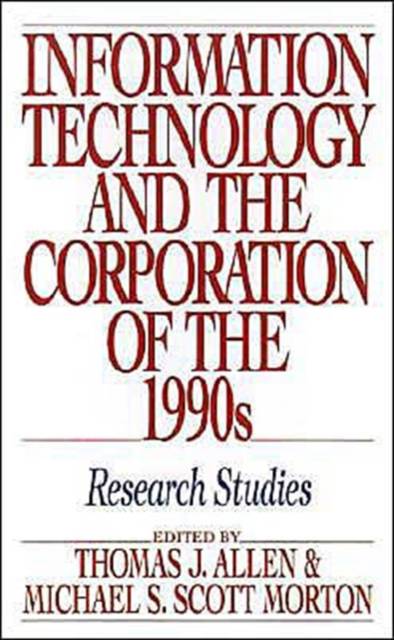
- Retrait gratuit dans votre magasin Club
- 7.000.000 titres dans notre catalogue
- Payer en toute sécurité
- Toujours un magasin près de chez vous
- Retrait gratuit dans votre magasin Club
- 7.000.0000 titres dans notre catalogue
- Payer en toute sécurité
- Toujours un magasin près de chez vous
Description
One of the most pathbreaking and influential business books of the 1990s is The Corporation of the 1990s by Michael Scott Morton. Its expert view of how information technology would influence organizations and their ability to survive and prosper in the 1990s has become the benchmark of thinking about information technology. Now, in a supporting companion volume, Information Technology and the Corporation of the 1990s makes available the research on which The Corporation of the 1990s was based. The research was conducted at the Sloan School of Management at MIT by the Management in the 1990s program. The program was funded by a group of 12 industrial and government sponsors from the United States and Britain which included American Express, Digital Equipment Corporation, Eastman Kodak, British Petroleum, MCI Communications, General Motors, U.S. Army, ICL Ltd., Internal Revenue Service, Ernst & Young, BellSouth, and CIGNA Corporation.
Information Technology and the Corporation of the 1990s aims to disseminate ideas on how organizations can manage the impact of information technology, and also to raise issues and stimulate further thought by both academics and professionals. The book is divided into three sections which cover the information technology revolution, strategic options, and organization and management responses. It incorporates the work of many important scholars including Charles Jonscher, Michael J. Piore, Thomas W. Malone. JoAnne Yates, Robert I. Benjamin, Gary W. Loveman, Eric von Hippel, Edgar H. Schein, Stanley M. Besen, Garth Saloner, N. Venkatraman, Akbar Zaheer, John C. Henderson, Jay C. Cooprider, Kevin Crowston, Jeongsuk Koh, Gordon Walker, Laura Poppo, John S. Carroll, Constance Perin, Brian T. Pentland, John Chalykoff, Lotte Bailyn, D. Eleanor Westney, Sumantra Ghoshal, John D.C. Little, Thomas J. Allen, Oscar Hauptman, Lisa M. Lynch, Paul Osterman, Thomas A. Kochan, and John Paul MacDuffie.
Information Technology and the Corporation of the 1990s aims to disseminate ideas on how organizations can manage the impact of information technology, and also to raise issues and stimulate further thought by both academics and professionals. The book is divided into three sections which cover the information technology revolution, strategic options, and organization and management responses. It incorporates the work of many important scholars including Charles Jonscher, Michael J. Piore, Thomas W. Malone. JoAnne Yates, Robert I. Benjamin, Gary W. Loveman, Eric von Hippel, Edgar H. Schein, Stanley M. Besen, Garth Saloner, N. Venkatraman, Akbar Zaheer, John C. Henderson, Jay C. Cooprider, Kevin Crowston, Jeongsuk Koh, Gordon Walker, Laura Poppo, John S. Carroll, Constance Perin, Brian T. Pentland, John Chalykoff, Lotte Bailyn, D. Eleanor Westney, Sumantra Ghoshal, John D.C. Little, Thomas J. Allen, Oscar Hauptman, Lisa M. Lynch, Paul Osterman, Thomas A. Kochan, and John Paul MacDuffie.
Spécifications
Parties prenantes
- Auteur(s) :
- Editeur:
Contenu
- Nombre de pages :
- 544
- Langue:
- Anglais
Caractéristiques
- EAN:
- 9780195068061
- Date de parution :
- 06-01-94
- Format:
- Livre relié
- Format numérique:
- Genaaid
- Dimensions :
- 162 mm x 244 mm
- Poids :
- 884 g

Les avis
Nous publions uniquement les avis qui respectent les conditions requises. Consultez nos conditions pour les avis.






